Yamaha vs. Honda Generators 2024 – Which One Is The Best?
I have given my honest opinion about Yamaha vs. Honda generators by comparing two generators from each brand based on price, noise, power output, reliability, weight and size, and durability.
Two of the most popular and reputable brands for generators are Honda and Yamaha.
Both take pride in manufacturing super quiet, lightweight, powerful, easy to maintain, safe, and ultra-reliable inverters and conventional generators for RVs, camping, boondocking, home backup, and general outdoor activities.
The main difference between Yamaha and Honda generators is the price and noise. Honda generators are slightly pricier and quieter. Other than that, both generators compete head-to-head in terms of power output, reliability, durability, weight, portability, and warranty.
To understand which generator is best for home, camping, or RV, let’s compare the brand and some of their top generators.
Yamaha Vs Honda Generators – Brand Comparison
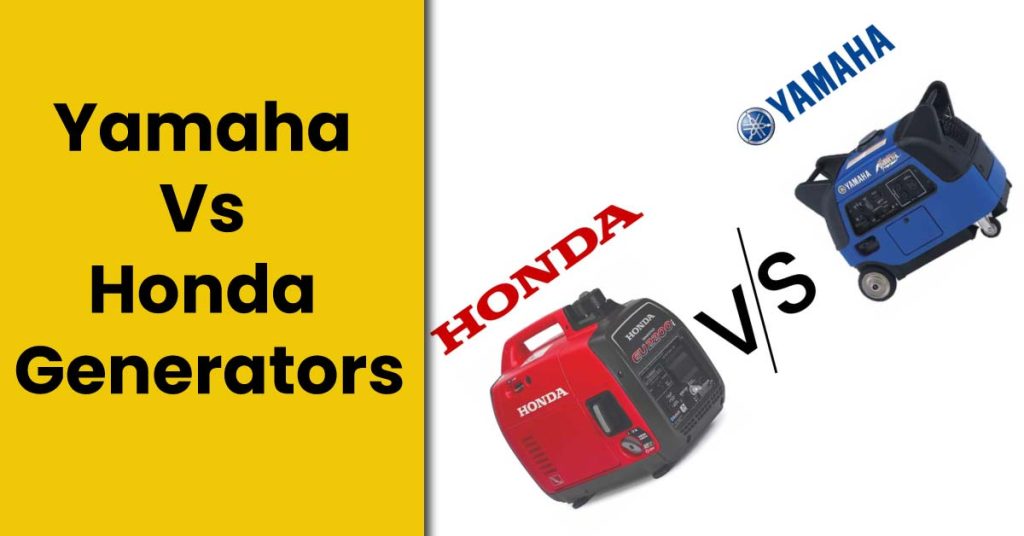
In 1973, Honda Brand first started manufacturing quality generators. Since then, they have been known to manufacture generators that produce clean power (very low harmonic distortion) so you can sensitive appliances. Some Honda generators can produce as much clean power as utility lines.
Moreover, Honda generators range from 1000 watts to 7000+ watts, and all of them have eco-throttle options to reduce engine speed and noise in cases of low load and a C0-sensor to automatically shut down the generator in cases of high carbon monoxide concentration.
When I was young, we used to have a Honda EG2200X in the 90s. I remember Dad used to take it with us camping and boondocking, and it never failed us.
The name Honda means durability and reliability. Their generators are specially engineered to last for a long time.
Here is the guide to know more about the Honda Brand
Yamaha brand has also been manufacturing generators since 1973, but their popularity rose to new heights when they released their Yamaha EF2000is 2000-watt generator in 2009.
This was a powerful and lightweight inverter generator that was preferred for RVs, and campers due to its low noise and longer runtime.
Since then, Yamaha has been constantly producing fuel-efficient, lightweight, and quiet generators for Homes and camping.
This is the only brand that can rival Honda in terms of reliability and durability.
Yamaha company make generator models from 2000 watt to 6000+ watts. Whether you want to power small camping appliances or run huge air conditioners, Yamaha got you covered.
Let’s further get into details by taking the Honda EU2200i and Yamaha EF2200is as references.
Which One is Quieter Between Yamaha and Honda?
Both Honda EU2200i and Yamaha EF2200is are quieter compared to other inverter generator brands, but Honda has a slight edge.
Honda 2200i generates only 48dB of noise from 23.5 feet away, and Yamaha has rated at 56 to 57dB from 23.5 feet away.
The Yamaha EF2200is is about 18 to 19% louder than the EU2200i. This is not true for all Yamaha generators because they use advanced noise-blocking and sound-reduction systems in their latest models.
However, Honda inverter generators are still a bit quieter than Yamaha according to my experience and expertise.
Which Produces More Power Output, Yamaha or Honda?
Both Honda EU2200i and Yamaha EF2200is are rated at 1800 running and 2200 surge watts. Yamaha features OHV, a 4-stroke air-cooled single cylinder, whereas Honda features OHC, a 4-stroke single cylinder.
Both generators are powerful. According to my load tests:
- Honda EU2200i was able to generate 2190 peak watts and 1780 running watts.
- Yamaha was able to generate 2193 peak watts and 1783 running watts.
I can’t distinguish which generator has the edge because both of them produce excellent power output.
But, if we compare all the inverter generators from both brands, Honda has a very slight edge which can be ignored.
Honda and Yamaha Runtime (Fuel-Efficiency)
I tested two Honda generators, and two Yamaha generators to gather data for the runtime test.
- Honda EU2200i: 8.1 hours @ 25% load (0.95 gal tank)
- Honda EU3000is: 20 hours @ 25% load (3.4 gal tank)
- Yamaha EF2200is: 10.45 hours @ 25% load (1.24 gal tank)
- Yamaha EF3000ISEB: 18.5 hours @ 25% load (3.4 gal tank)
As we can see, EF2200is has a slight edge over EU2200i because of the large fuel tank, but EU3000is beats Yamaha EF3000ISEB despite having the same size fuel tank.
Which One is Better For Camping, Honda or Yamaha?
Both generator brands are preferred for camping. Both are quiet, powerful, compact, and lightweight with good fuel efficiency. The only difference I can think of is the price.
If you can afford it, HONDA will be a better option considering its reputation, but Yamaha will also come in handy if your pocket is a little tight.
We also have compared the honda and predator generators make sure to have one if you are hunting for one.
Yamaha vs Honda Generators – Model Comparison
1. Yamaha EF2200is vs Honda EU2200i
| Specifications | HONDA EU2200i | Yamaha EF2200is |
|---|---|---|
| Image | 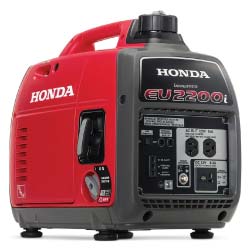 | 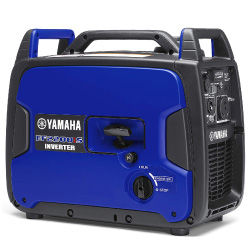 |
| Type | Inverter | Inverter |
| Peak watts | 2200 | 2200 |
| Running watts | 1800 | 1800 |
| Engine | OHV, 4-stroke, single cylinder. 121cc | OHV, 4-stroke, single cylinder. 79cc |
| Fuel tank | 0.95 gal | 1.24 gal |
| Noise | 57 from 23.5 feet away @ 25% load. | 48 from 23.5 feet away @ 25% load. |
| Runtime | 8.1 hours at 25% load | 10.45 hours at 25% load |
| Outlets | x2 120V AC 15A outlets, a battery charging DC 12V outlet | x2 120V AC 15A outlets, a battery charging DC 12V outlet |
| Starter | Manual recoil | Manual recoil |
| Weight | 47.4lbs. | 55.2lbs. |
| Dimensions | 20 x 11.4 x 16.7 inches | 21.9 x 18.8 x 18.5 inches |
| Warranty | 3-year warranty on all generators for both residential and commercial use | 3-year limited warranty |
| Eco-mode | Yes | Yes |
| CO SENSOR | Yes | No |
| Parallel connection | Yes | Yes |
| Price | Check Price | Check Price |
Both Yamaha EF2200is and Honda EU2200i generate 1800 running watts and 2000 surge watts.
Honda’s engine is 121cc whereas Yamaha has a 79cc engine. The problem is, that EU2200is has a small fuel tank of 0.95 gallons despite having a bigger engine.
This doesn’t affect the fuel efficiency but compared to Yamaha EF2200is which has a 1.21-gallon fuel tank, Honda missed the mark here.
EU2200i generates only 48dB of noise from 23.5 feet away, and Yamaha EF2200is is rated at 56 to 57dB from 23.5 feet away. Honda is the winner.
I took some runtime tests of both generators and the results are:
- Honda EU2200i: 8.1 hours @ 25% load (0.95 gal tank)
- Yamaha EF2200is: 10.45 hours @ 25% load (1.24 gal tank)
Yamaha has the edge here, but it has a bigger fuel tank. At only a 0.95-gal tank, the EU2200i is one of the most fuel-efficient inverter generators ever manufactured.
In terms of maintenance, Honda has many generators that are very easy to maintain, but Yamaha is a step ahead.
Honda recommends cleaning the combustion chamber of EU2200i after 300 hours of usage, but EF2200is only needs its head to be cleaned after 300 hours once per year.
If we talk about camping or outdoor life in general, every single gram of your luggage counts, and the Honda EU2200i is a few pounds lighter.
It is not like Yamaha is super heavy, but if you are a weight-conscious guy and you don’t want to carry any extra luggage with you, you should go for Honda.
Yamaha is only $50 to $60 cheaper than Honda which isn’t big enough to get you away from one or another. It boils down to whether you want to reduce noise and weight with Honda, or you want a longer runtime with Yamaha.
Read the complete review of the Honda EU2200i.
2. Yamaha EF300iSEB vs HONDA EU3000is
| Specifications | HONDA EU3000is | Yamaha EF3000iSEB |
|---|---|---|
| Image | 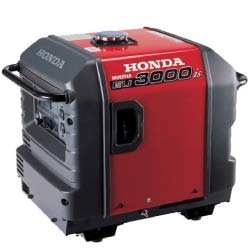 | 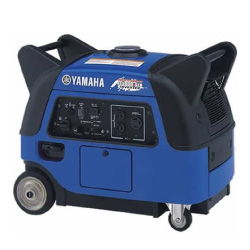 |
| Type | Inverter | Inverter |
| Peak watts | 3000 | 3000 (+5000 boost) |
| Running watts | 2800 | 2800 |
| Engine | OHV, 4-stroke, single cylinder. 196cc | OHV, 4-stroke, single cylinder. 171cc |
| Fuel tank | 3.4 gal | 3.4 gal |
| Noise | 53 to 54dB from 23.5 feet away on ECO mode | 55 to 57 100% load from 30 feet away |
| Runtime | 20 hours at 25% load, | 18.6 hours at 25% load |
| Outlets | 12V DC, 20A and 30A 120V AC, 30A Twist lock | X2 120V 20A (5-20R), 120V 30A (TT-30R). USB |
| Starter | Manual recoil, electric | Manual recoil |
| Weight | 130.7lbs. | 154.6lbs. |
| Dimensions | 25.9 x 17.6 x22 inches | 26.5 x 17.8 x 21.9 inches |
| Warranty | 3-year warranty on all generators for both residential and commercial use | 3-year limited warranty |
| Eco mode | Yes | Yes |
| CO SENSOR | Yes | No |
| Parallel connection | Yes | Yes |
| Price | Check Price | Check Price |
Both Yamaha EF300iSEB and Honda EU3000is can produce 3000 surge watts, and 2800 running watts, but in reality, EU3000is can get as close as 2750 running watts whereas Yamaha can generate up to 2700 running watts according to my load tests.
Honda EU3000is produces 53 to 54dB from 23.5 feet away on ECO mode whereas Yamaha is rated 55 to 57 100% load from 30 feet away according to my noise tests. Honda is the winner here.
EU3000is has a 196cc engine and Yamaha EF300iSEB is built with a 149cc. Despite having a huge difference in engine sizes, both generators have 3.4-gallon fuel tanks.
EF300iSEB’s fuel efficiency is 18.7 hours at 25% load, and EU3000is’s fuel efficiency is 20 hours at 25%. Honda takes pride in manufacturing highly fuel-efficient generators. Honda is the winner.
The EU3000is weighs 130.6 pounds, whereas the Yamaha weighs 154.3 pounds. Both generators are not that lightweight and portable for everyone, but Honda is the most compact and portable one among the two.
It all boils down to the price. The Yamaha EF300iSEB is around $780 to $800 cheaper than the Honda EU3000is.
For the extra money, Honda offers a bit more runtime, less noise, compact dimensions, and a brand name. Other than that, both generators are almost the same.
Read the complete review of Honda EU3000is.
Yamaha vs. Honda Generators – Who is The Winner?
I love both brands, I have had inverter generators of both brands for a long time. Honda generators offer good noise control and compact dimensions whereas Yamaha generators require little to no maintenance.
Both offer great runtime, both are powerful, reliable, perfect for camping, and durable. It all boils down to the price. Honda is slightly pricier because it is still considered the king of the market.
So between Yamaha vs. Honda Generators, HONDA is the winner.

Alex Black is a seasoned electrical engineer with a remarkable 8-year track record specializing in appliances, generators, and transfer switches. With extensive hands-on experience in the field, Alex possesses a deep understanding of electrical systems and their intricate workings. Throughout their career, Alex has consistently demonstrated expertise in designing, troubleshooting, and maintaining various electrical appliances.
